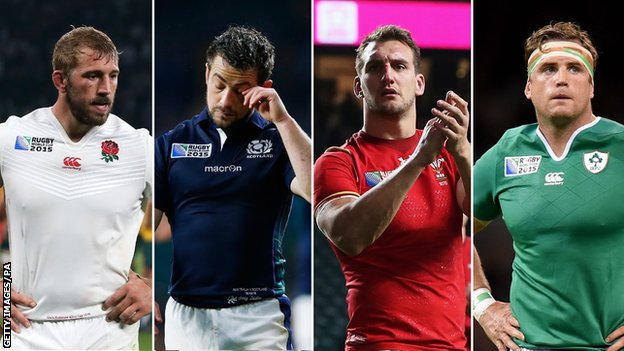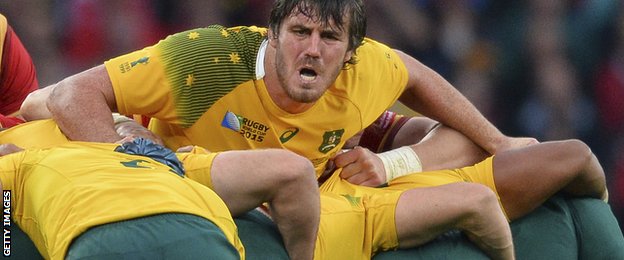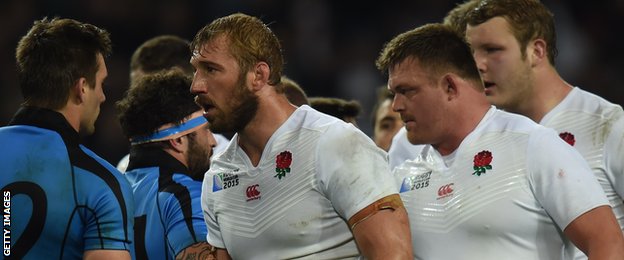
Wales' brave defence sprung late by the
Springboks. France eviscerated by an All Blacks assault. Ireland torn
apart by the Pumas. Scotland jumped at the death by the Wallabies.
Amid all that independent lament, a collective failure.
In six of the seven World Cups there have been two northern hemisphere
teams in the semi-finals. Never before have there been none.
It may not be the death of European rugby, but it is a party where the hosts and neighbours have all gone to sleep early. What has gone wrong, and what must change if the north is to rise again?
The sexy stuff
It is a cliche that keeps proving to instead be a permanent truth: the handling skills of southern hemisphere players appear superior to their counterparts in the old world.This is not to say that there are not players who can step and swerve, off-load and time a pass in the north. It is that there are fewer of them, that they are less integral to their teams and they are seldom found across the positions from one to 15.
On Saturday night in Cardiff, two All Blacks tries came from prop-forwards off-loading like centres - Charlie Faumuina for Kieron Read's score, Joe Moody for Tawera Kerr-Barlow's. South Africa's critical try against Wales came from number eight Duane Vermeulen passing behind his own back despite having two defenders clambering all over him.
Where do these skills come from? From the culture that breeds the young talent, particularly in New Zealand, from the pace and tactical emphasis of the game in the Super 14 regional competition and international Rugby Championship, from a coaching philosophy that encourages evasion as much as contact, speed of thought and deed over brute force.
And these abilities flourish under the pressure of knockout rugby. Wales created enough chances to beat Australia and South Africa but they lacked the ruthlessness to finish them off.
For all the legitimate gripes about Craig Joubert's decision to award Australia that critical late penalty, Scotland lost their own line-out to create the chaos from which it came.
The muscle
The pretty stuff can only follow if physical supremacy has been established.All four of the southern hemisphere teams now have a set-piece that can provide a solid platform for all that follows, all four the forwards who can do the grunt as well as the glorious.

Australia lock Kane Douglas
at the heart of a Wallabies scrum that battered England and Wales, but
faltered at times against Scotland
At the breakdown each have the power to secure quick ball and the brute force to mess up their opponents'. There are stalwart blind-sides in the north, fine defensive players who can tackle all day. But there are precious few open-sides who can compete with Richie McCaw or Michael Hooper and David Pocock for their ability to scavenge turnovers and steal precious penalties.
The conditions
This might be a northern hemisphere World Cup, but it has played like a southern tournament.After an autumn better than the summer that preceded it the pitches have been firm, the ball dry and the skies clear. There has barely been any wind.
It has allowed the southerners to play with the sun on their faces and the ball in hand. It has negated some of the opposing strengths that their old rivals have traditionally built their successes on - a forward-dominated grind, an unholy hail of high balls, a game built on cautious control rather than free-thinking and free-scoring.
Rain? So little of it has there been that it was a shock to look up into the floodlights at the crescendo to Scotland's battle with Australia to see Twickenham turned into Edinburgh in February. Cold? Only the pints that have flowed before and after.
The darker arts
For all that sweet handling and heavy muscle, the southern hemisphere teams in this tournament have understood the less salubrious stuff too.Sometimes you have to play the referee as much as the game in front of you. And where England failed to adapt to Romain Poite's interpretations at the scrum and breakdown against Australia, or Wales gave away 12 penalties against the Springboks, the semi-finalists have all proved themselves adept at both stepping up and stepping back.
There was South Africa scrum-half Fourie du Preez buzzing in the ear of Wayne Barnes against Wales ("Why don't you play the game, and leave the reffing to me?" Barnes replied at one point), McCaw committing three likely offences but escaping unpunished in the passage of play that culminated in France's Louis Picamoles getting sin-binned instead, and the sight of several Wallabies throwing their hands up and demanding the penalty at the death against Scotland.
You might not like it. But it goes on, and it can decide a contest.
The rise of empires and the fall of others
Not all the blame can be carried equally. Scotland, winners of the Six Nations' wooden spoon this year, cannot be said to have failed in reaching the last eight and being a single point away from a first semi-final in 24 years. Wales lost nine players to injury, Ireland their twin totems of Paul O'Connell and Jonny Sexton.This is more about the big boys who have crumbled like never before.
France reached the last World Cup final four years ago, the semi-finals in the previous two and the final again in 1999. Only once in seven tournaments have they failed to get past the quarter-finals. England have made the semis in four of them and gone on to the final three times.
Why the decline? The French national team appears to be paying the price of a domestic game whose focus lies elsewhere: in importing big-name foreign talent, in putting strength before subtlety, in producing teams that can win in Europe rather than players to light up Les Bleus.

England won only two of their four group games, against Fiji and Uruguay
England? We have been here before, but take your pick: inexperienced coaches, muddled selection, a late switch in style to safety-first that ended being anything but.
Then there are the upstart kids who have grown into men. Argentina's exposure to the Rugby Championship has developed them into a force like never before. 'The Big Three' has become 'The Big Four', an already crowded top table significantly more competitive.
The precedents
For all that, is too much expected of the north?England is the richest union of all, with playing resources like no other. Irish teams have dominated the European competitions, and rugby still obsesses Wales like nothing else.
But only once have a northern hemisphere team won the World Cup. Ireland had played five quarter-finals before Sunday and lost them all. Scotland have not reached the last four since 1991. Wales have now lost 17 of their last 18 games against South Africa.
This year's tournament may not look pretty for the north, but neither does it look new. There is a reason why Wales, Ireland and Scotland are all coached by natives of New Zealand. The power, and the glory, lies in the south once again.
No comments:
Post a Comment